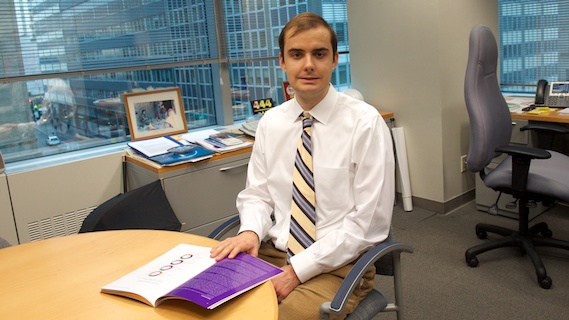
From his home in Manhattan’s financial district, BMCC student Paul Borri couldn’t help noticing that the lights in nearby commercial buildings burned bright 24 hours a day—even when the buildings were locked, unoccupied and unused.
“This was a ridiculous waste of electricity as well as a cause of light pollution, which is harmful to people and wildlife,” he says. “So I decided to do something about it.”
Putting people and animals at risk
Borri drew up a petition, collected 45 signatures from neighbors, and presented his case at a meeting of Community Board 1. Apart from the extravagant wastefulness of keeping the lights on around the clock, he said in his statement to the Board, “there’s also evidence that it’s a health risk for humans, both for sleep deprivation and a reduction in tumor-suppressing melatonin.”
Light pollution is also detrimental to wildlife, he noted, “confusing migrating birds and causing them to crash into illuminated buildings.”
The easiest and most effective way to address the problem, Borri suggested, would be through the installation of occupancy sensors. “These are motion detectors that would shut off the lights when they aren’t being used,” he explained.
The Community Board agreed and drafted a resolution that outlined the environmental, economic and health hazards created by commercial light pollution.
“The technology, such as sensors, timers and dimmers, already exists, and has been proven to mitigate light pollution,” the Board noted, calling attention to the fact that the city does not currently regulate commercial light pollution.
Seeing the light
In its resolution, the Board urged the City Council “to look into the feasibility of the creation of standards and regulations pertaining to commercial light pollution.” It also requested that “our State and Federal representatives tighten the environmental standards for commercial light emissions.” The resolution passed by a 35-0 vote and was sent to the attention of City Council member Margaret Chin.
Borri, who has been diagnosed with a developmental disorder, is an active member of Beyond the Limits, a BMCC club for students with disabilities and those interested in disability issues. He is also involved with the CUNY Coalition for Students with Disabilities (CCSD).
He recently discussed his anti-light pollution campaign with Beyond the Limits faculty adviser Jessica Spalter, who suggested the possibility of linking it to CUNY’s ongoing energy conservation initiative.
Meanwhile, Borri’s efforts have won plaudits from his downtown neighbors, fellow students and, of course, Community Board 1, which congratulated him “on his research and advocacy.”
STORY HIGHLIGHTS
- Protests 24/7 lighting of commercial buildings
- Circulates a petition and gathers signatures of local residents
- Brings his case against light pollution to his Community Board

